Public urged to turn in unused prescription drugs at Take Back Day
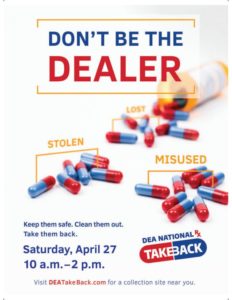 Misusing prescription drugs often is the first, tragic step people take into addiction, so safely disposing of unneeded prescription drugs is the first, crucial step people should take to fight a deadly opioid crisis that claimed more than 3,100 lives in New Jersey last year, federal, state and local officials said during a press conference at City Hall in Trenton this morning.
Misusing prescription drugs often is the first, tragic step people take into addiction, so safely disposing of unneeded prescription drugs is the first, crucial step people should take to fight a deadly opioid crisis that claimed more than 3,100 lives in New Jersey last year, federal, state and local officials said during a press conference at City Hall in Trenton this morning.
Catholic Charities, Diocese of Trenton Executive Director Marlene Laó-Collins joined Trenton Mayor Reed Gusciora and other officials in urging the public to participate in National Prescription Drug Take Back Day this Saturday. The event aims to provide a safe, convenient, and responsible means of disposing of prescription drugs, while also educating the general public about the potential for abuse of medications.
To locate a safe-disposal site near you, click here. (Sites cannot accept liquids or needles or sharps, only pills or patches.) The service is free and anonymous, no questions asked.
Fueling the addiction crisis
Unused prescription drugs, left unsecured in one’s home, could be lost, stolen, or misused accidentally or intentionally by family members and friends, the officials warned. And trashing old medication by flushing them down a toilet or sink or putting them in the garbage can contaminate the environment, they added.
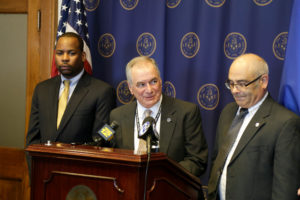 “Drugs that would normally be languishing in medicine cabinets and kitchen counters can do harm,” said Dr. Anthony Ferreri, regional director of the U.S. Department of Health and Human Services (pictured, left at podium, with Mayor Reed Gusciora on right). “They were not intended for harm. They were intended to help the ill and the injured. Unfortunately, once those drugs serve their purpose, they wind up staying in homes. And what we have found in recent years is that 4 out of 5 heroin users started their addiction on prescription drugs. So it’s very, very important for us to remove those drugs from the homes where they can be diverted to children and adults who really shouldn’t be using them.”
“Drugs that would normally be languishing in medicine cabinets and kitchen counters can do harm,” said Dr. Anthony Ferreri, regional director of the U.S. Department of Health and Human Services (pictured, left at podium, with Mayor Reed Gusciora on right). “They were not intended for harm. They were intended to help the ill and the injured. Unfortunately, once those drugs serve their purpose, they wind up staying in homes. And what we have found in recent years is that 4 out of 5 heroin users started their addiction on prescription drugs. So it’s very, very important for us to remove those drugs from the homes where they can be diverted to children and adults who really shouldn’t be using them.”
Take Back events have been tremendously successful in the nine years since the federal Drug Enforcement Administration launched the initiative, with people turning in 11 million pounds of unneeded prescription drugs in 16 Take Back events, Ferreri added.
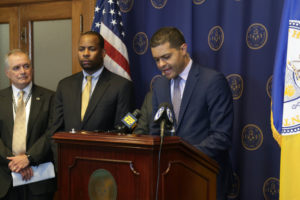 Beat the scourge
Beat the scourge
Forty-three percent of people who receive any type of prescription in New Jersey get opioids, said Dr. Shereef Elnahal, commissioner of the New Jersey Department of Health. Health officials are working to discourage doctors from unnecessarily prescribing opioids. But in the meantime, collections like Saturday’s Take Back Day remain a critical weapon in the fight against the opioid epidemic, he said.
“It’s an opportunity for us to beat the scourge of public health problems that come from uncontrolled circulation and distribution of people’s prescription drugs they have in their homes, including opioids,” Elnahal said. “This is a problem that has taken a devastating toll on the state, writ large, and also in Trenton.”
Ongoing collection
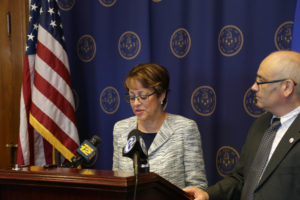 Anyone who can’t participate Saturday need not despair. The state has an ongoing initiative called Project Medicine Drop, in which people can drop off unwanted medications 365 days a year to “prescription drug drop boxes” inside participating police departments.
Anyone who can’t participate Saturday need not despair. The state has an ongoing initiative called Project Medicine Drop, in which people can drop off unwanted medications 365 days a year to “prescription drug drop boxes” inside participating police departments.
“We must work to prevent prescriptions from getting lost, stolen or otherwise into the wrong hands, because an ounce of prevention is worth a pound of cure,” said Laó-Collins (pictured, left).
Catholic Charities, Diocese of Trenton is on the forefront of the battle against addiction in Central Jersey. The agency offers medication-assisted treatment, support groups, and other recovery options for people struggling with substance use disorder, regardless of religious affiliation or ability to pay.
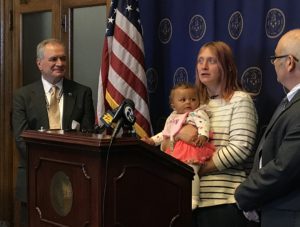 Recovery is possible
Recovery is possible
Sabrina (pictured right) is a Trenton mother enrolled in For My Baby and Me, an addiction program for pregnant women and new mothers who are homeless or at risk of homelessness. It’s run by a coalition of six community groups, including Catholic Charities, who meet participants’ every need, including addiction treatment, prenatal, birth and postnatal care, housing, transportation, and job skills. See the video below for a deeper look at that life-saving program.
Sabrina spent years struggling to overcome her addiction before she began treatment in For My Baby and Me. This week, she celebrated one year in recovery. During that time, she gave birth to a healthy baby girl, married her long-time partner, and moved into a safe, affordable, permanent apartment.
At this morning’s press conference, she told listeners that her descent into addiction started when she was just 16 with Percosets, a prescription pain-reliever that’s an opioid.
“Prescription pills were the first thing I ever tried. So this (Take Back Day) is really important. And she thinks so too,” Sabrina said, as she held up her smiling, bright-eyed baby Alyssa.
Subscribe for more news
For more information: For addiction recovery, call our Access, Help and Information Center at 1-800-360-7711 to connect with compassionate, professional care.
To subscribe to our blog posts and news releases, fill out the fields below.

